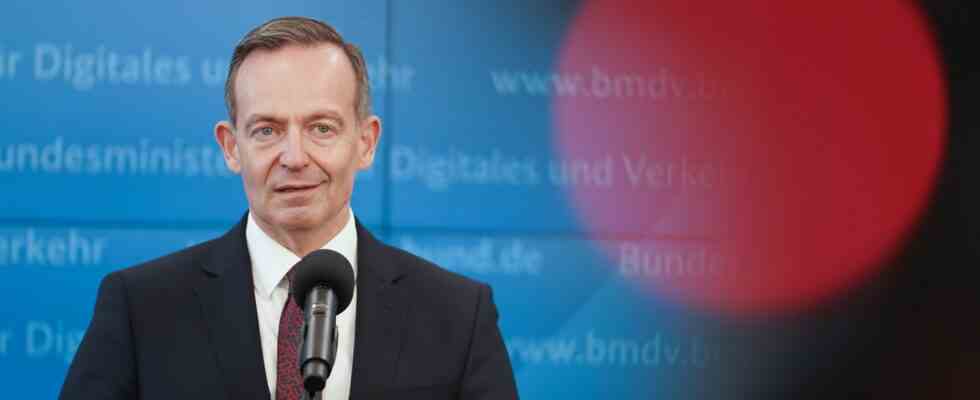Status: 07/19/2022 08:52 a.m
The 9-euro ticket is a “huge success” for Minister of Transport Wissing. He thinks a follow-up offer is possible at the end of the year at the earliest – before that, one wants to wait for data for a better evaluation of the ticket.
Federal Minister of Transport Volker Wissing considers a follow-up offer for the 9-euro ticket to be possible at the end of the year or at the beginning of 2023. The previous model expires at the end of August. The FDP politician told the dpa news agency that he wanted to wait until the beginning of November for data on the ticket to help with the assessment.
The data should answer questions such as “What is the experience with it? What role does the price play? What role does easy handling or Germany-wide validity play?” There is a lot of speculation, but the answers to the questions are not really known. “That’s why we need the results of the evaluation.”
Proposals for successor model
Public transport can be used in Germany between June and August for nine euros a month. Among other things, a 365-euro annual ticket or a 69-euro monthly ticket were suggested for a follow-up model. The main issue here is financing. The federal government is financing the current 9-euro ticket with around 2.5 billion euros.
Wissing does not want to commit to a successor solution yet. “We need a model that fits into the budgets of the federal states and also into the budget of the federal government.” If there is an agreement between the federal and state governments, it could happen quickly. “We have seen that we were able to put a proposal on the table and offer a digital ticket within a few weeks. In this respect, I am optimistic that this time too it can be done quickly,” said the Minister of Transport.
Ticket for Wissing a “huge success”
At the halfway point of the 9-euro ticket, Wissing believes that key goals have been achieved. “We triggered something that was very important for public transport, namely a push for modernization,” he said. “As a result, public transport has become a bit more digital, it has become simpler and it is more focused on passengers,” says Wissing. He rated the ticket a “huge success”.
An additional 21 million tickets were sold, and passenger numbers rose back to the level before the pandemic. Less than 0.1 percent of the trains were so busy that security staff had to intervene. However, Wissing emphasizes that the price-performance ratio must be right. “It’s not the case that the lowest price always brings about the greatest satisfaction. If the performance behind it isn’t right, then it’s no use for anyone to be able to drive for one euro, but the clocks don’t fit,” said Wissing with a view to the proposed 365 euro ticket.
Wissing also wants to give an impetus to eliminate the “tariff jungle” in local transport. “We have many train stations, some of which have multiple ticket machines that nobody really understands.”
Greenpeace wants to scrap climate-damaging subsidies
The environmental association Greenpeace is clearly in favor of a follow-up ticket. According to Greenpeacce, a long-term, affordable public transport service offers answers to two pressing problems: It noticeably relieves the households hit by the energy crisis and it promotes climate protection in traffic, said Greenpeace traffic expert Marissa Reiserer.
According to Greenpeace surveys, the modal shift through such a ticket could reduce CO2 emissions by two to six million tons per year. Depending on the cost of the ticket, households could save several hundred euros a month. In terms of financing, Greenpeace proposes eliminating climate-damaging subsidies, such as the commuter allowance.

